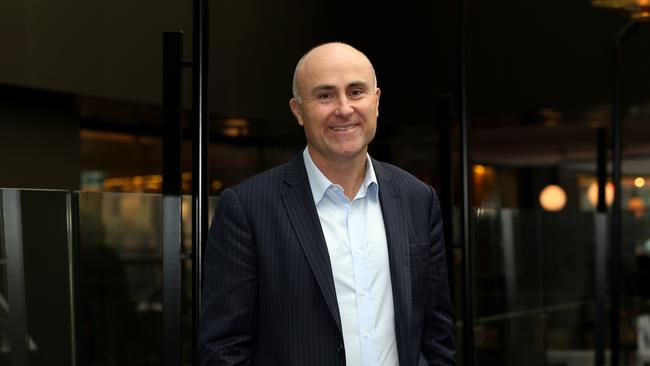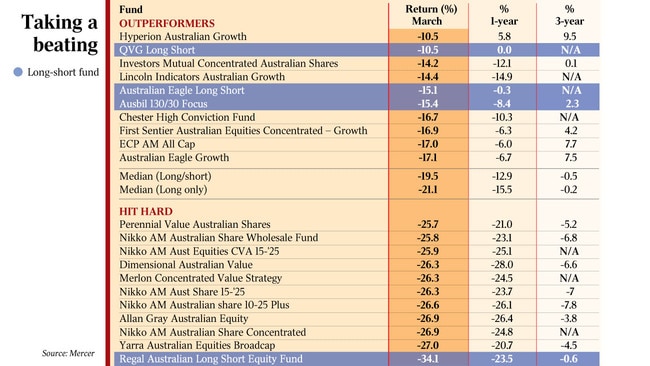Fund managers slash costs, cut pay after returns slump in March meltdown
Fund managers reeling from a slump in March performance are taking drastic steps to cut costs and navigate the COVID-19 fallout.

Fund managers reeling from a slump in March performance are taking drastic steps to cut costs and navigate the COVID-19 fallout, which has exposed the biggest divergence between top and bottom performers since the global financial crisis.
The measures include salary cuts for fund management employees, headcount reductions and in some cases lower fees for end customers, as firms look to ride out the market rout and position themselves for any upturn.
The 21 per cent fall in the ASX200 in March made it the worst month for the sharemarket since the October 1987 Black Monday sharemarket crash.
Mercer data puts the March median performance of investment managers at minus 20.5 per cent, with the top quartile group posting losses of 18.8 per cent and the bottom group minus 22.8 per cent.
For the March quarter, median performance was -23.5 per cent with the top quartile on -21.2 per cent and the bottom at -27.4 per cent.
In light of the pandemic’s impact on markets, The Australian understands Ashok Jacob-led Ellerston Capital has imposed some salary reductions on employees instead of redundancies to survive the challenging times.
The Ellerston Australian Market Neutral Fund was down 15.2 per cent in March and fell 20.6 per cent in the quarter, while the Australian share fund fell 21 per cent for the month and 27 per cent in the quarter. Over five years, the Ellerston Australian share fund is slightly negative with returns of 0.7 per cent per annum compared to positive 1.39 per cent for its benchmark.
However, only one of the ten funds in Ellerston’s stable performed below benchmark and the Mr Jacob-run Ellerston GEMS was down only 2 per cent in the quarter and up 10 per cent over the past year.
Regal Funds Management is understood to have cut a handful of employees during the COVID-19 crisis, but none were key portfolio managers.
A letter distributed to investors admitted the firm had “underestimated the initial speed and scale” at which the pandemic took hold of markets and asset prices. But the firm said it was now “very happy” with its current portfolio allocations and was well-positioned to take advantage of opportunities as returns in April were improving.
The letter pointed to Regal having successfully navigated prior sharp market downturns.
Mercer data had the Regal Australian Long Short Equity Fund down 34.1 per cent in March, but the firm’s Atlantic Absolute Return Fund tumbled 59 per cent. The latter fund has, however, delivered 30.2 per cent in annualised returns since its inception in 2004.

Mercer equities principal Mark Vrkic said despite the unprecedented nature of this year’s market shock, some funds had become more defensive as they anticipated the end of a record bull sharemarket run.
“They (fund managers) did a better job this time round than the last downturn,” he said, referring to the fourth quarter of 2018. “The speed of these (2020) events has been unprecedented. In the height of the storm … it is very much driven by top-down factors (rather than stock-picking).”
Mr Vrkic said during the GFC the median fund manager underperformed for six quarters before posting an improvement on a rolling one-year basis.
Mercer’s data put the Yarra Australian Equities Broadcap fund at the bottom of the pack in the long-only share funds, on March performance. At the other end of the spectrum the Hyperion Australian Growth fund was the best performer in Mercer’s universe alongside the QVG Long Short fund, with both posting negative returns of 10.5 per cent.
Not all funds are included in Mercer’s snapshot of industry performance. Others that have traversed the volatility and wild market swings comparatively well include hedge fund Totus Capital’s Alpha Fund with an impressive 10.4 per cent March return, and ASX-listed Concentrated Leaders Fund which returned -14.8 per cent in March but outperformed its benchmark by almost 6 per cent.
Yarra Capital Management’s performance in the Australian Equities Broadcap fund was adversely affected by its exposure to energy and infrastructure stocks, including Transurban and Sydney Airport.
Other funds that have had a tough trot include the L1 Capital Long Short Fund, which was down 23 per cent in March and has tumbled 34.1 per cent this calendar year.
Last week, Auscap Asset Management attempted to get on the front foot to soften the blow for investors from its March performance.
Auscap had a horror March with performance of its long short Australian equities fund down 47.3 per cent in March and 46.8 per cent fiscal-year-to-date. Some of its largest holdings include ANZ, Westpac, Nine Entertainment and Unibail-Rodamco-Westfield.
The fund is said to have slashed its base fee by one-third until it restores positive returns. Performance fees will be waived and the fund added a second benchmark that needs to be exceeded for it to be eligible for that.
Research house Chant West this week released data showing super funds gave up 10 per cent in the March quarter, the worst returns since the introduction of compulsory super nearly three decades ago.
Separately, retail and sophisticated investors may also be up in arms after smaller advisory firms including Bell Potter, Crestone Wealth Management and Escala Partners pitched and sold them bonds in Virgin Australia ahead of the airline being placed in administration this week.
A spate of fund managers have already pulled the plug on their firms in recent years as fee and other competitive pressures took hold.
Managers such as Discovery Asset Management, Adam Smith Asset Management and Concise Asset Management shut their doors in the past three years, while London-headquartered Janus Henderson in early 2019 closed several Australian equities funds, amounting to about $490m under management. Mercer’s Mr Vrkic said he didn’t think the current challenges facing investment managers would necessarily lead to a further shake-out in the local market.
“We’ve seen that trend. This (market downturn) has provided no new impetus for managers to go under,” he added. “The weaker ones have already gone … but it is all dependent on the duration.”



